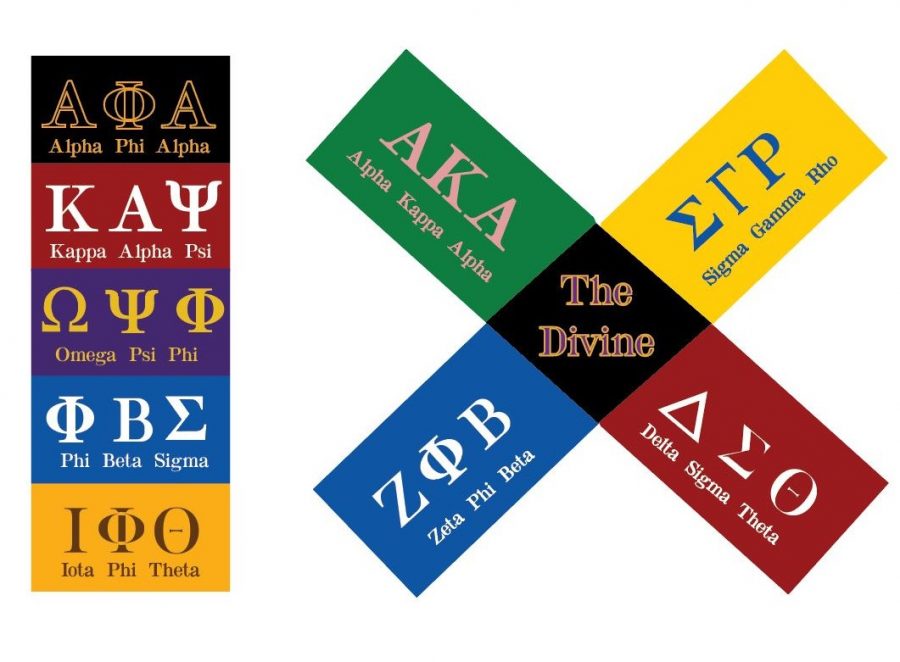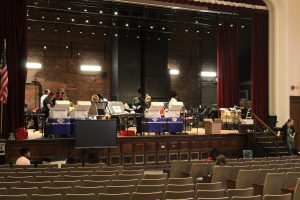BHM: The Divine Nine
The Divine Nine is composed of five fraternities and four sororities, also known as Black Greek Letter Organizations (BGLOs).
February 17, 2021
Phi Beta Kappa of the William and Mary College in Williamsburg, VA, was the first collegiate social fraternity to be founded. The first sorority was founded in 1851 at Wesleyan College in Macon, GA. Both of these spaces were created to foster community within collegiate spaces, while also upholding leadership, service and academic excellence.
However, this community and its participation was exclusive to white students, as a method to further discriminate and isolate Black students from the collegiate experience. Black students were excluded from social events and targeted at Historically Black Colleges and Universities (HBCUs) and other public universities by the Ku Klux Klan and other racial terrorist mobs.
This made the need for collegiate societies on Black campuses more imperative, to serve not only as social outlets but also as a physical form of protection for Black students. It wouldn’t be until 1930 that the years of campaigning and protests finally yielded significant progressive change and unification.
The National Panhellenic Council (NPHC) was founded at Howard University to extend such resources, opportunities and a sense of community to Black students. Several Black fraternities and sororities had already been started prior to the creation of the NPHC; however, the NPHC allowed them to unite on a stronger front and take greater strides in establishing themselves as respectable and accredited.
Nine Black Greek Letter Organizations (BGLOs) were officially developed with distinct and specific missions to uphold Black excellence and prestige. The BGLOs include five fraternities and four sororities, which have become known as the Divine Nine.
The first historically Black fraternity, Alpha Phi Alpha Fraternity, Inc, was founded at Cornell University on Dec. 4th, 1906. The fraternity is represented by the colors black and gold, with over 800 chapters and approximately 300,000 initiated members. Their motto, “First of All, Servants of All, We shall transcend All,” reflects how much they pride themselves on community service and civic engagement, focused on being positive examples of Black leadership. Some notable members include Dr. Martin Luther King Jr., Thurgood Marshall, W.E.B. DuBois and Fredrick Douglass.
The first historically Black sorority, Alpha Kappa Alpha Sorority, Inc., was founded at Howard University on Jan. 15th, 1908. They are known for their salmon pink and apple green emblem that’s adorned with pearls. There are 1,018 chapters and nearly 300,000 initiated members around the world promoting their motto, “By Culture and By Merit.” Some notable members include Vice President Kamala Harris, Maya Angelou, Rosa Parks, Coretta Scott King and Toni Morrison.
Trailing in crimson and cream is the Kappa Alpha Psi Fraternity, Inc, founded at Indiana University on Jan. 15th, 1911. Its 721 chapters and 150,000 members represent the Kappa Diamond by encouraging their motto, “Achievement in Every Human Endeavor.” They’re focused on promoting social, spiritual, intellectual and moral welfare, as well as looking to inspire service within local communities of need. The organization includes Nupes such as Henry “Hank” Aaron, Colin Kapernick, John Singleton and Johnnie L. Cochrann Jr.
Shining in purple and gold stands Omega Psi Phi, Fraternity Inc, founded at Howard University on Nov. 17th, 1911. This fraternity is represented by the African Violet and its over 700 chapters and over 250,000 men, who promote unifying college men with ideals of scholarship, the fostering of humanity, freedom and dignity as a community and as a nation. The brothers look to uphold their motto, “Friendship is essential to the soul,” in their actions both in and beyond college. Some famous Omegas include Langston Hughes, Sterling Brown, Tom Joyner, Steve Harvey and Count Basie.
Delta Sigma Theta, Sorority Inc, founded at Howard University on Jan. 13th, 1913, is the female counterpart to Omega Psi Phi Fraternity Inc. Its 1,000 chapters and 200,000 initiated members sport red and cream colors as they provide assistance to and establish service programs in communities worldwide. Their motto is, “Intelligence is the Torch of Wisdom.” Some renowned Deltas associated with the sorority are Shirley Chisholm, Barbara Jordan, Patricia Roberts Harris and Soledad O’Brien.
Phi Beta Sigma, Fraternity, Inc was founded at Howard University on Jan. 9th, 1914. These brothers chose to be symbolized by a dove and the colors royal blue and white. The 100,000 initiated members from over 800 chapters live to lead and serve without bias, following their motto, “Culture for Service and Service for Humanity.” Some brothers include Rep. John Lewis, Harry Belafonte, George Washington Carver and Huey P. Newton.
The sister organization of Phi Beta Sigma, Zeta Phi Beta, Sorority Inc, was founded at Howard University on Jan. 20, 1920. These sisters work to commemorate and act with scholarship, service and sisterhood in their hearts as they strive to be examples for other Black female youth. This, “community-conscious, action-oriented organization,” is represented by 125,000 members spanning 850 chapters across the world. Some notable Zetas include Zora Neale Hurston, Dionne Warwick, Syleena Johnson and Minnie Riperton.
The youngest Divine Nine sorority, Sigma Gamma Rho, Sorority Inc, was founded by seven school teachers from Indianapolis, IN, on Nov.12th, 1922. These sisters are draped in royal blue and gold as they pave the way for, “Greater Service, Greater Progress.” Over 100,000 initiated members across 500 chapters push for the greater good in education, service and leadership development. Some famous alumni include Renee Powell, Kelly Price, Hattie McDaniels and M.C. Lyte.
Completing the Divine Nine list is Iota Phi Theta, Fraternity Inc , founded at Morgan State University on Sep. 19th, 1963. These brothers proudly display their colors of charcoal brown and gilded gold as they fulfill their mission of, “Building a Tradition, Not Resting Upon One!” They seek to develop and perpetuate scholarship, leadership, citizenship, fidelity and brotherhood amongst their 301 chapters and 30,000 members. Some notable alumni include Spencer Christian, Harry Alford and T.C. Carson.
Each organization is rich in its own history, part of what makes each stand so uniquely across the board. This uniqueness is also displayed through varying stroll routines and calls performed at probates in the yard or at other public gatherings, which help promote unity within on campus settings.
Unfortunately, the representation of Greek life in films, television shows and even social media portrays them to be rooted in hazing, partying and privilege. However, that’s not an entirely true nor complete narrative.
These organizations were built to serve and protect Black students when they were constant targets of violence on campus and in the community. Divine Nine members have made lifetime commitments to their cause, principles and the communities that need them. Members from across the world join these distinct organizations for their own personal agendas to be a part of something bigger than themselves, rooted in serving others and fostering beneficial growth within the community.
Some Louisville natives expressed their experiences and favorite moments with their organizations.
“I went to K-State back in ‘08 when K-State was known to be this ‘party’ school. Yes, there were social events and people chose to have fun. The problem occurs when people don’t know how to make that separation between priorities. As a Delta, I knew that there was always someone watching. That helped me hold myself accountable to make sure I was always on my P’s and Q’s,” Juantrice Denson, a Delta Sigma Theta Soror, said.
“It’s more than an organization, they can change your life and make you a better man. Big Brothers and alumni help find you jobs and connect you with the right people by just saying they’re a Bruh. It’s like the bond is in ink. I’ve never seen anything like it outside of the brotherhood,” Duane Houghton, a Omega Psi Phi Brother, said.
“I loved everything about being part of an international family. You may run into someone on the street or in the store with a pink and green crest on their mask and you automatically feel connected…we all went through the journey of becoming a sister that no one can understand until you become one,” Christina Booth, an Alpha Kappa Alpha Soror, said.
People make mistakes in every new experience, however, with guidance and mentorship, mistakes become lessons that can make us better people. Some members share what they would’ve done differently to make their experience easier.
“Don’t wait until freshman year to look into organizations. Figure out what you like most about each and what fits you because once you are initiated, there really is no going back. Everyone in your fraternity experienced the same struggles and they expect you to persevere because the goal to cross is attainable, but, it takes personal discipline to pull through,” Andre Wilkerson, a Kappa Alpha Psi Brother, said.
“Joining is a commitment to yourself and your sisters that you can support each other and your community when needed. This requires you to have your head on straight and focus, especially if you expect that from everyone else,” Ashley Durand, a Zeta Phi Beta Soror, said.
“Be intentional about what you say and how you carry yourself while on campus, on social media and beyond because there are brothers everywhere watching to see how you uphold tradition and legacy without a Big Brother present,” Houghton said.
Many have become greater examples in their own professional lives due to this gained knowledge and experience as members.
“Zeta life showed me how to demonstrate my intelligence, poise and leadership skills without pleading my case. I learned how to exude my confidence in my abilities without boasting or being arrogant, but illustrating my talents in my work. Attention to detail and quality in every aspect of what I do as an entrepreneur helps understand the needs of my audience and my own goals,” Durand said.
“Being a Delta made me a better student and educator. I learned how to maximize my patience and problem solving skills as a student…,” Denson said.
“As a coach, my brothers taught me how to want for everyone’s success as much as my own. As a leader, your team looks to you for the right answers and the feedback that makes them better… What type of coach would I be, if I didn’t want to see my kids win?” Wilkerson said.
The presence of the Divine Nine has unified generations of Black students in higher education and influenced growth within their members as they continue into adulthood. They have connected thousands upon thousands by experiences, backgrounds, tribulations and created bonds that transcend many barriers. Barriers that have been overcome by nine distinctive names, stories of perseverance against discrimination and legacies known as none other than the Divine Nine.









